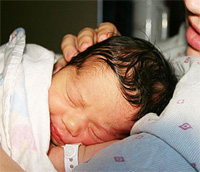Fluid Retention & Bloating During Pregnancy
 Bloating and water retention are normal during pregnancy, so normal in fact that about 50% of all pregnant women experience it.
It is usually at it’s worst during the third trimester, but can happen at any time. It is also usually worse during the summer months, especially if you live in a really hot and humid climate.
Bloating and water retention are normal during pregnancy, so normal in fact that about 50% of all pregnant women experience it.
It is usually at it’s worst during the third trimester, but can happen at any time. It is also usually worse during the summer months, especially if you live in a really hot and humid climate.
Ways to fight bloating during pregnancy
Water retention or ‘bloating’ is usually a result of rising hormone levels which cause you to retain more fluid than you would normally. Luckily there are a number of different ways to help reduce the effects of this during your pregnancy, and some of these include:- Lie down or elevate your feet regularly. Try and get your feet elevated as much as you can, especially during the third trimester.
- Avoid wearing tight-fitting clothes, shoes or stockings as these will only restrict the blood flow and make your fluid retention worse.
- Exercise will also help you a great deal with fluid retention, try swimming, yoga or walking.
- Avoid diuretic drugs, especially during the early weeks of pregnancy.
- Drink water- try and ensure that you are drinking at least 6-8 glasses of water a day. You should be doing this even if you are not suffering from fluid retention anyway.
- Anise
- Celery
- Onion
- Parsley
- Coffee or tea (include in moderation due to caffeine content)
- Herbal Teas
- Eggplant
- Garlic
- Peppermint
Bloating During Pregnancy



